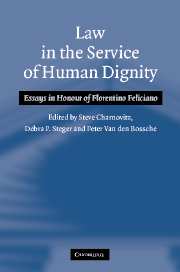Book contents
- Frontmatter
- Contents
- List of contributors
- Preface
- Biographical note
- List of abbreviations
- PART I Reflections on the contributions of Florentino Feliciano to international law
- PART II Insights into the World Trade Organization
- PART III The changing landscape of investment arbitration
- PART IV New challenges in international adjudication
- 21 From Preston to Prescott: globalizing legitimate expectation
- 22 The independence of the international judiciary: some introductory thoughts
- 23 ‘Straddling and highly migratory flags’ before the International Tribunal for the Law of the Sea
- 24 Collective security and the personalization of peace
- 25 Some thoughts on ‘Asian’ approaches to international dispute resolution
- 26 The Cameroon v. Nigeria; Equatorial Guinea Intervening (Land and Maritime Boundary) Judgment
- Bibliography of works by Florentino Feliciano
- Index
23 - ‘Straddling and highly migratory flags’ before the International Tribunal for the Law of the Sea
from PART IV - New challenges in international adjudication
Published online by Cambridge University Press: 29 July 2009
- Frontmatter
- Contents
- List of contributors
- Preface
- Biographical note
- List of abbreviations
- PART I Reflections on the contributions of Florentino Feliciano to international law
- PART II Insights into the World Trade Organization
- PART III The changing landscape of investment arbitration
- PART IV New challenges in international adjudication
- 21 From Preston to Prescott: globalizing legitimate expectation
- 22 The independence of the international judiciary: some introductory thoughts
- 23 ‘Straddling and highly migratory flags’ before the International Tribunal for the Law of the Sea
- 24 Collective security and the personalization of peace
- 25 Some thoughts on ‘Asian’ approaches to international dispute resolution
- 26 The Cameroon v. Nigeria; Equatorial Guinea Intervening (Land and Maritime Boundary) Judgment
- Bibliography of works by Florentino Feliciano
- Index
Summary
Flagging and reflagging in the cases before ITLOS
Reflagged vessels and vessels flying flags of convenience (two phenomena that most often coexist) are a frequent feature in cases brought before the International Tribunal for the Law of the Sea (ITLOS). Of all the cases decided by the ITLOS, only two had nothing to do with this phenomenon: the Southern Bluefin Tuna cases and the MOX Plant case. Only the former involves ships in some way, as it concerns fishing. The Saiga cases, the Camouco, the Monte Confurco, the Grand Prince, and the Volga cases all concern ships which had been reflagged one or more times; and all concern ships flying a flag belonging to a state that has modest connections with the ship. If we take the substantive criteria for ship registration used in the ill-fated United Nations Convention on the Registration of Ships of 7 February 1986, namely that the flag state or its nationals participate as owners or in the ownership of the ship, and that ‘a satisfactory part of the complement consisting of officers and crew’ be ‘nationals or domiciled or lawfully in permanent residence’ in the flag state, we see that neither of them is satisfied in each of the above-mentioned five cases. Of course, the reference to these criteria is broad and general. It does not mean that under the Convention, which indicates the two criteria as alternative and not as cumulative and provides for exceptions and loopholes, the ships involved would not qualify for registration.
- Type
- Chapter
- Information
- Law in the Service of Human DignityEssays in Honour of Florentino Feliciano, pp. 323 - 335Publisher: Cambridge University PressPrint publication year: 2005
- 1
- Cited by



